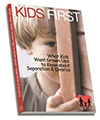


We understand that parents and families going through a major transition, such as separation and divorce, may have some financial constraints. Kids First Center has scholarships available so parents can attend classes at a reduced cost. Scholarship amounts can vary and depend on the financial circumstances of each parent. Please complete the form below to start the scholarship process.
If you'd like to learn more about our programs or to apply for financial assistance, please email us at info@kidsfirstcenter.org, or call us at 207-761-2709, Monday-Friday, 9 am to 4 pm. Need-based scholarships for Maine residents are made possible, in part, by a grant from the Maine Judicial Branch. The Kids First Center's goal is to make its programming affordable for all parents, children, and allies regardless of financial hardship.

Authored by Kids First Center
Topics Include:
What separation feels like to kids
Listening to children
Telling kids about the separation
Steps toward a healthy co-parenting partnership
Kids' residence
Kids' transitions
Holidays and celebrations
Parental anger
New relationships, new families
Order Book Below
Pro Tip #1: It is the conflict that children experience between their parents that is harmful, not the divorce or separation itself.
Pro Tip #2: The language that you use is important—think of your child’s other parent as a “co-parenting partner” or “CPP,” not as an “ex-“ anything.
Pro Tip #3: Children are not possessions; avoid saying “MY kids” or “MY time.”
Pro Tip #4: Being the “primary residential parent” does NOT mean that you are the “primary parent.” It only means that your children reside with you more than 50% of the time.
Pro Tip #5: To be an effective co-parent, it is important to build a community of friends, family members, and professionals who support your effort to co-parent. Reject the notion that divorce or separation needs to be a battle of the “good guys” versus the “bad guys.”
Pro Tip #6: It is okay to acknowledge that break-ups are hard and often result in sadness and bitterness. At the same time, you do not have the luxury of making your children wait until you feel better to begin effectively co-parenting
.
Pro Tip #7: Assume that your children are listening to EVERY word you say about your CPP and watching EVERY interaction. Speak and act respectfully, regardless of what your CPP says or does.
Pro Tip #8: Your goal is not to be a perfect co-parent; you goal is to be “good enough.” This means saying you are sorry and being accountable when you screw up—and screw-ups are inevitable!
Pro Tip #9: Surprises are the enemy of an effective co-parenting relationship and structure is its friend.
Pro Tip #10: Transitions between households need to be arranged so that each parent shows the other respect and common courtesy. Do NOT be the parent who is nicer to the grocery store clerk than you are to your CPP.
Pro Tip #11: There is no shame or weakness in allowing your CPP a “do-over” if things do not go the way you want. Teach your children that mistakes and forgiveness are parts of life, and each mistake is a new opportunity to learn and try again.
Pro Tip #12: Co-parenting is not a sprint; it is a marathon. Your CPP may very well become your “CGP” (co-grandparenting partner) one day!